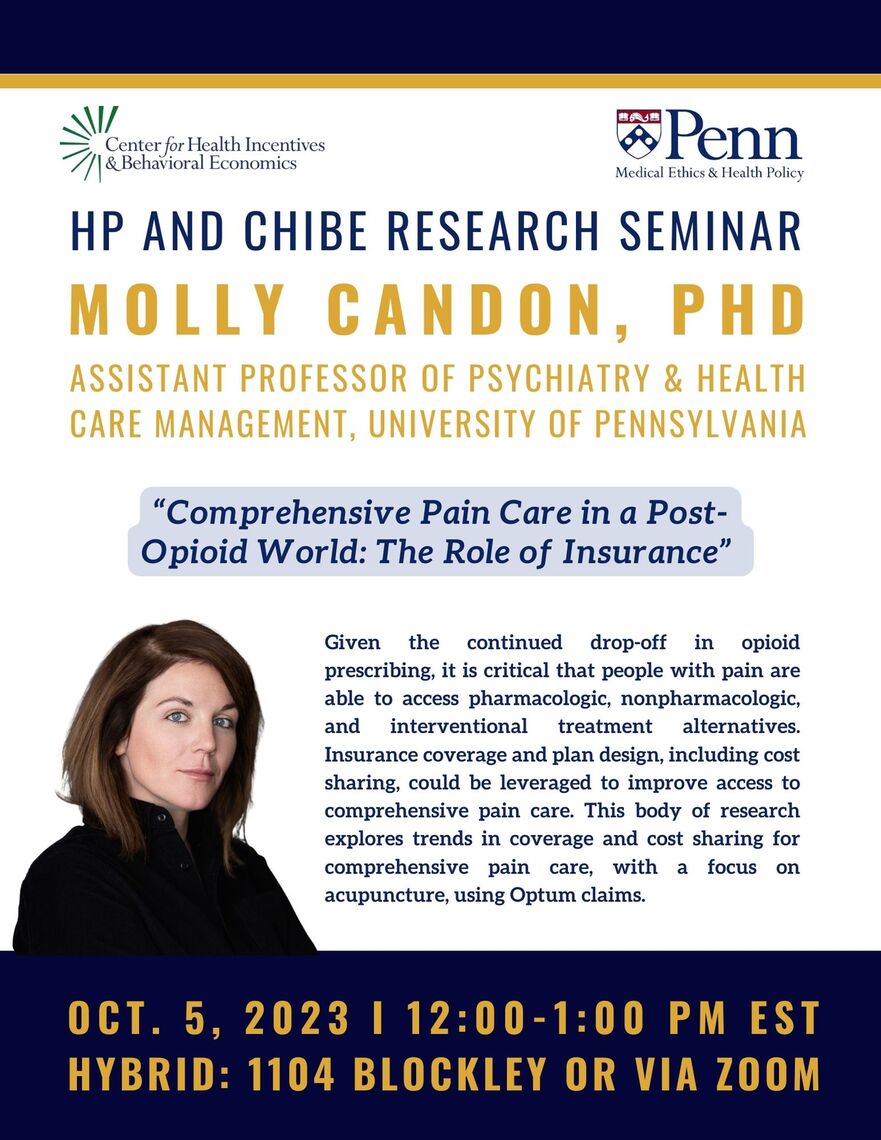Molly Candon, PhD │Health Policy and CHIBE Research Seminar
12:00pm - 1:00pm • Hybrid
2023-10-05 12:00:00 2023-10-05 13:00:00 America/New_York Molly Candon, PhD │Health Policy and CHIBE Research Seminar HEALTH POLICY AND CHIBE RESEARCH SEMINAR “Comprehensive Pain Care in a Post-Opioid World: The Role of Insurance” Molly Candon, PhD, Assistant Professor of Psychiatry (Perelman School of Medicine) and Health Care Management (Wharton School), University of Pennsylvania Thursday, October 5, 2023 | 12:00-1:00 PM EST | Hybrid Event Attending in person? 1104 Blockley Hall is located at 423 Guardian Drive, Philadelphia, PA, 1910 Lunch will be provided. Attending virtually? Click the following link to join at noon EST on 10/5: https://upenn.zoom.us/j/95353951407. Given the continued drop-off in opioid prescribing, it is critical that people with pain are able to access pharmacologic, nonpharmacologic, and interventional treatment alternatives. Insurance coverage and plan design, including cost sharing, could be leveraged to improve access to comprehensive pain care. This body of research explores trends in coverage and cost sharing for comprehensive pain care, with a focus on acupuncture, using Optum claims. Molly Candon, PhD is a health economist and an Assistant Professor in the Center for Mental Health (Department of Psychiatry, Perelman School of Medicine) and in the Department of Health Care Management (Wharton School) at the University of Pennsylvania. Molly studies how insurance design and reimbursement can be leveraged to improve access to and the quality of chronic pain management and behavioral health care. She currently has a K award from the National Center for Complementary and Integrative Health that focuses on coverage and cost sharing for acupuncture therapy. She also co-directs the Evaluation Center, a joint venture between the Center for Mental Health, Community Behavioral Health, and Philadelphia’s Department of Behavioral Health and Intellectual Disability Services, where she is leading projects on data-driven suicide prevention and the differential effects of pharmacologic and nonpharmacologic treatments for opioid use disorder. Hybrid Penn Medical EthicsHEALTH POLICY AND CHIBE RESEARCH SEMINAR
“Comprehensive Pain Care in a Post-Opioid World: The Role of Insurance”
Molly Candon, PhD, Assistant Professor of Psychiatry (Perelman School of Medicine) and Health Care Management (Wharton School), University of Pennsylvania
Thursday, October 5, 2023 | 12:00-1:00 PM EST | Hybrid Event
Attending in person?
1104 Blockley Hall is located at 423 Guardian Drive, Philadelphia, PA, 1910
Lunch will be provided.
Attending virtually?
Click the following link to join at noon EST on 10/5: https://upenn.zoom.us/j/95353951407.
Given the continued drop-off in opioid prescribing, it is critical that people with pain are able to access pharmacologic, nonpharmacologic, and interventional treatment alternatives. Insurance coverage and plan design, including cost sharing, could be leveraged to improve access to comprehensive pain care. This body of research explores trends in coverage and cost sharing for comprehensive pain care, with a focus on acupuncture, using Optum claims.
Molly Candon, PhD is a health economist and an Assistant Professor in the Center for Mental Health (Department of Psychiatry, Perelman School of Medicine) and in the Department of Health Care Management (Wharton School) at the University of Pennsylvania. Molly studies how insurance design and reimbursement can be leveraged to improve access to and the quality of chronic pain management and behavioral health care. She currently has a K award from the National Center for Complementary and Integrative Health that focuses on coverage and cost sharing for acupuncture therapy. She also co-directs the Evaluation Center, a joint venture between the Center for Mental Health, Community Behavioral Health, and Philadelphia’s Department of Behavioral Health and Intellectual Disability Services, where she is leading projects on data-driven suicide prevention and the differential effects of pharmacologic and nonpharmacologic treatments for opioid use disorder.
